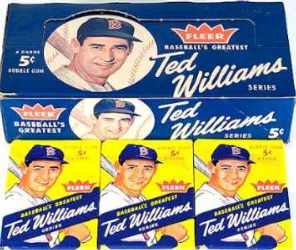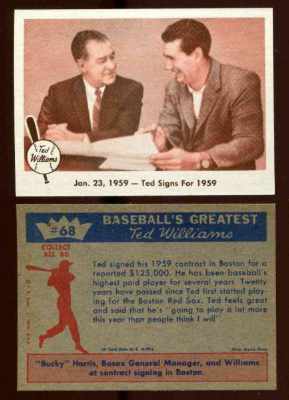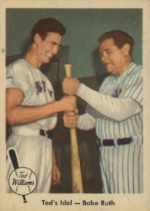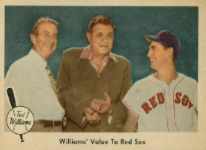Steve Carlton - AUTOGRAPHED Limited Edition GARTLAN Figurine (1989/90)
8 inch cold cast ceramic figurine LIMITED to 3,290 MADE (career strikeouts) w/COA ! eBay 'Buy-it-Now' prices of $199,$175,$149 & $135.

Please wander around the website for more info, prices, values & images
on vintage baseball, football, basketball, hockey, sport and non-sports cards.
1959 Fleer Ted Williams baseball cards |



1987 Topps Baseball Cards |

1972 O-Pee-Chee BaseballAlso referred to as OPC or Topps Canada, most vintage OPC sets were near replicas of the Topps cards from that year. Exactly same in design they usually only differed with the addition of French to the backs and some fronts. Cards differed from their Topps versions mostly due to "Made in Canada",
French/English and different colored backs.
the sets, such as "Boyhood Photos" and "In Action" cards.
Card #465 Gil Hodges is the only card differing significantly from
its corresponding Topps card, which notes his April of 1972 death.
First Time features were "Boyhood Photos" and "In Action" cards.
The O-Pee-Chee cards can be distinguished from Topps cards by
This was also the first year the cards denoted O.P.C. in the
copyright line rather than T.C.G.
There is one card in the set which is notably different from the
corresponding Topps, Gil Hodges #465, which notes his death in April
on the OPC card.
Cards differed from their Topps versions mostly due to "Made in Canada",
French/English and different colored backs.
the sets, such as "Boyhood Photos" and "In Action" cards.
Card #465 Gil Hodges is the only card differing significantly from
its corresponding Topps card, which notes his April of 1972 death.
First Time features were "Boyhood Photos" and "In Action" cards.
The O-Pee-Chee cards can be distinguished from Topps cards by
This was also the first year the cards denoted O.P.C. in the
copyright line rather than T.C.G.
There is one card in the set which is notably different from the
corresponding Topps, Gil Hodges #465, which notes his death in April
on the OPC card.
TOP ROOKIE: Carlton Fisk is the only rookie of note.
Note: You may be on that page right now. |

Starting approximately in 1886, sportscards, mostly baseball cards, were often included with tobacco products, for promotional purposes and also because the card reinforced the packaging and protected cigarettes from damage. These sports cards are referred to as tobacco cards in the baseball card hobby. Over the next few years many different companies produced baseball cards. Tobacco cards soon started to disappear as the American Tobacco Company tried to develop a monopoly by buying out other companies.
They were reintroduced in the 1900s, as American Tobacco came under pressure from antitrust action and Turkish competition. The most famous and most expensive, baseball card is the rare T206 Honus Wagner. The card exists in very limited quantities compared to others of its type because Wagner forced the card to be removed from printing. It is widely (and incorrectly) believed that Wagner did so because he refused to promote tobacco, but the true explanation lies in a dispute over compensation.
Soon other companies also began producing baseball and football cards. Sports magazines such as The Sporting News were early entries to the market. Candy manufacturers soon joined the fray and reflected a shift toward a younger target audience for cards. Caramel companies were particularly active and baseball cards were one of the first prizes to be included in Cracker Jacks. World War I soon suppressed baseball card production.
 This special 80-card set from the Frank H. Fleer Company honors Ted Williams,
"The Splendid Splinter." While other companies vied for Topps' exclusive player
rights, Fleer successfully secured Ted Williams, who, nearing the end of his
career, remained one of the best and most popular players.
This special 80-card set from the Frank H. Fleer Company honors Ted Williams,
"The Splendid Splinter." While other companies vied for Topps' exclusive player
rights, Fleer successfully secured Ted Williams, who, nearing the end of his
career, remained one of the best and most popular players.
 Of particular note is Card #68, "Ted Signs for 1959," which pictures him signing
his contract. The photo also included Red Sox GM Bucky Harris, who was under one
of those exclusive deals with Topps at the time. This led to the card being pulled,
making it extremely scarce. Unfortunately, reprints of the card surfaced in the
1970s. This is widely considered the first baseball card to be
reprinted/counterfeited. Interestingly, the counterfeits were allowed to remain
on the market, so caution is advised when dealing with this card.
Of particular note is Card #68, "Ted Signs for 1959," which pictures him signing
his contract. The photo also included Red Sox GM Bucky Harris, who was under one
of those exclusive deals with Topps at the time. This led to the card being pulled,
making it extremely scarce. Unfortunately, reprints of the card surfaced in the
1970s. This is widely considered the first baseball card to be
reprinted/counterfeited. Interestingly, the counterfeits were allowed to remain
on the market, so caution is advised when dealing with this card.
 Cards were sold in both six-card and eight-card wax packs. For some reason,
the scarcer 8-card packs contained no gum.
Cards were sold in both six-card and eight-card wax packs. For some reason,
the scarcer 8-card packs contained no gum.

